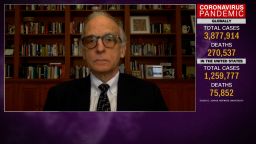Editor’s Note: Kent Sepkowitz is a physician and infectious disease expert at Memorial Sloan Kettering Cancer Center in New York. The views expressed in this commentary are his own. View more opinion on CNN.
Dr. Anthony Fauci’s move to step down as President Joe Biden’s chief medical adviser and director of the National Institute of Allergy and Infectious Diseases in December no doubt will kick off discussions about the political implications of his decision.

Much will likely be written about how Monday’s announcement comes on the heels of a reorganization at the US Centers for Disease Control and Prevention. And there may be some palace intrigue about Fauci’s departure, particularly since his previously targeted retirement was at the end of Biden’s term.
My guess is that there is little to such speculation. After more than 50 years in public service, I imagine Fauci was tired of all the current Covid-19 noise and death threats as well as the tedious discussions that characterize all bureaucratic jobs, much less the ludicrous accusations that he was cashing in on the pandemic and therefore sought to prolong it. Though fit as a fiddle, he probably – as he admitted to The Washington Post recently – is starting to feel his age. (He’ll be 82 in December.)
But I doubt strongly he gave up because he was frightened or intimidated. After all, Fauci has spent decades in the public eye and has previously been the recipient of seemingly endless criticism, but nevertheless he has always persisted.
I am one of countless infectious disease doctors who sort of knows “The Fowch” (as those in this frat refer to him). OK, I don’t really know him. I have shaken his hand a few times and said hello, usually greeted by a wary look of “Is this guy going to ask me for a favor?” He has been a celebrity at infectious disease meetings for years, and referring to him as “Tony” is sure to signal the same sort of uber-cool, privileged access one might indicate by calling Dylan “Bob.”
Looking across his career, though, infectious disease was not Fauci’s first love – at least academically. He is one of the last products of the odd coupling between infections and inflammatory diseases (including allergy), still codified in the name of the National Institutes of Health branch that he has overseen for almost 40 years: the National Institute of Allergy and Infectious Diseases.
In 1955, when NIAID was formed, these disease groups were loosely bunched together around the recognition of the role of immunity in each set of conditions. The hope in the 1950s apparently was that one day, management of immunity could help cure both infections that took hold because of inadequate immune protection and diseases like rheumatoid arthritis (or allergies) that occur because the immune system seemed to be misfiring altogether.
A young Fauci anchored his academic career in that group of condition called autoimmune diseases. In 1971, he was lead author in a New England Journal of Medicine article describing use of low doses of chemotherapy to weaken the immune system deliberately to treat a severe autoimmune disease, an audacious and ultimately lifesaving approach.
He was a well-known expert in these conditions when HIV appeared in 1981 and, under President Ronald Reagan, was tasked with both leading research in the biology of the disease – his bailiwick – and increasingly as one of the key voices of an administration that had great difficulty speaking about AIDS.
Fauci’s initial foray into the public eye was anything but inspiring: AIDS activists were harshly critical of his work and his priorities and suggested he was responsible for the deaths of their friends and loved ones. Over time, by appreciating then relying on the patient perspective, Fauci came to be something of a hero in the fight against the infection.
He also had a front row seat to see how poorly integrated federal agencies are when a new disease threat appears. Although all health-related activity falls under the Department of Health and Human Services, the boundaries between the NIH (and within it, the NIAID), the CDC and the US Food and Drug Administration do not appear, at least to the amateur observer, to be clearly marked as to who does what in a crisis.
Yet the public always needs a single “expert” to inform and warn, not a confusing rotation of this one from Bureau A and that one from Bureau B. Indeed, much of Fauci’s national ascent related more to his steadiness, decency, Boy Scout rectitude and ability to speak in plain language than to a specific expertise in disease management.
This spokesman role continued through subsequent presidents and infections to great acclaim until his well-characterized collision with the Trump White House over management of Covid-19. Fauci’s crime, according to a critical piece of the public, appeared to be that he tried to guess what was coming next from a never-seen-before pandemic. When he was wrong, he was accused of misleading the public. Many, it seems, expected Fauci to be a fortuneteller and failed to recognize that all medical experts are tasked with making their best judgment calls when faced with uncertainty. Some of those calls will inevitably turn out to be incorrect.
And now, with the pandemic – maybe – starting to recede, he has decided to move on. When Covid-19 goes down in the history books, what likely will stick out about Fauci’s leadership will be not his intelligence, doggedness and humbling work ethic but rather this: He is a true believer in the importance of improving the public’s health, even at personal cost.
The choice to pursue this lonely path, despite the slings and arrows, is what should serve as inspiration through whatever Covid-19 – or the next pandemic – may bring us.





